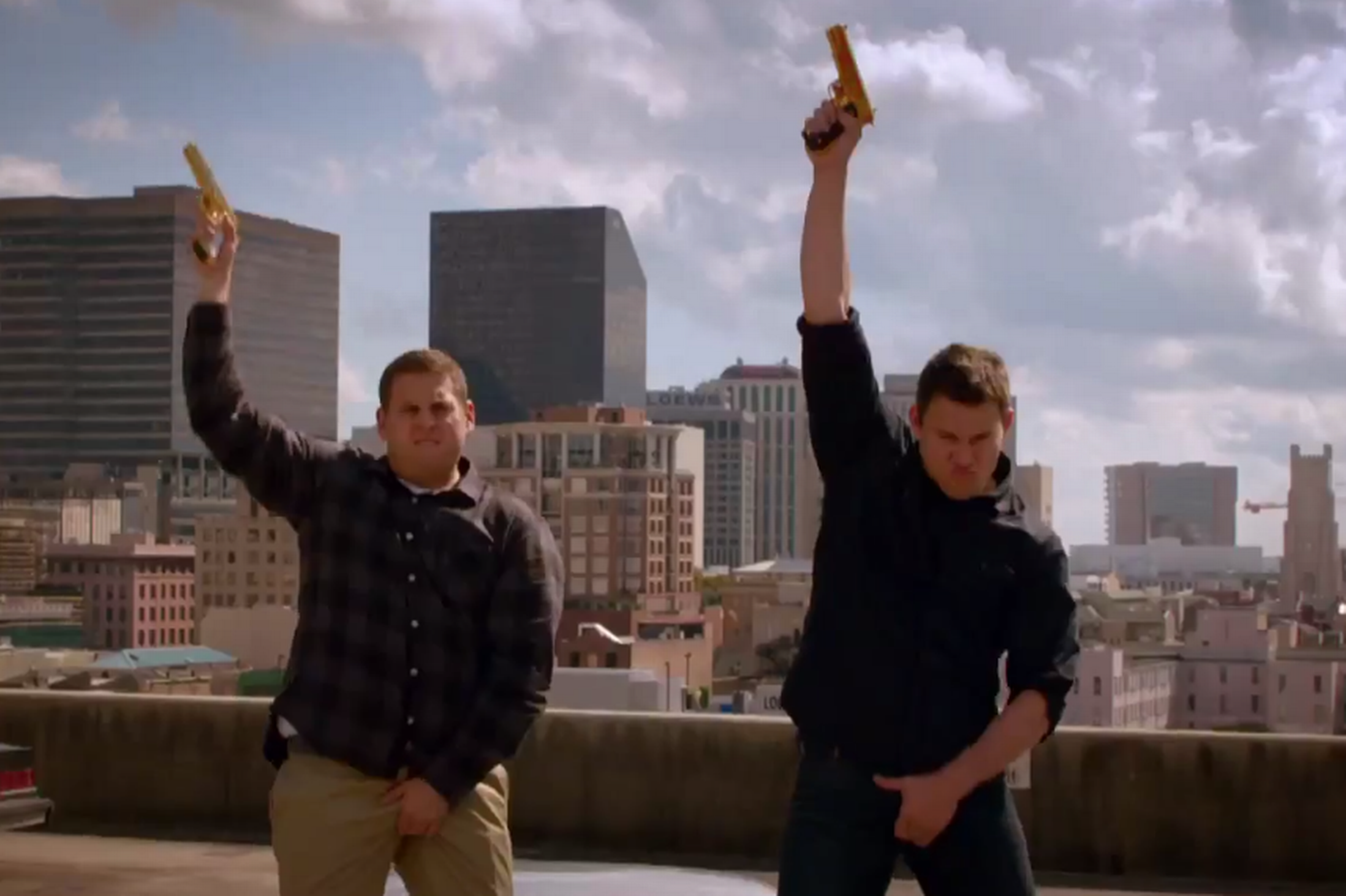22 Jump Street is not as good as 21 Jump Street. Jonah Hill, Channing Tatum, and directors Phil Lord and Christopher Miller know this, and use their self-awareness to their advantage. 22 Jump Street is a sequel about the tropes of sequels, justifying the similar story and adding an edge to the comedy. Plus Ice Cube finally gets an office befitting his namesake.
After a “Previously On…” segment, Jenko (Tatum) and Schmidt (Hill) end up in college tracking down a drug dealer for a new drug. At MC State, Jenko becomes a football star and Schmidt becomes a slam poet to investigate their case. Tension arises when Jenko befriends Zook (Wyatt Russell), his blonde clone, pushing Schmidt out of the picture. Schmidt in turn hooks up with Maya (Amber Stevens) and gets in deep water with Captain Dickson (Ice Cube). Events converge at Spring Break where Tatum and Hill confront their feelings and the bad guys.
It will be hard to top 22 Jump Street on the joke front. This movie has several insightful and clever gags that will be repeated ad nauseam for a new generation of kids. Kids today are much more immersed in pop culture, and 22 Jump Street’s self awareness gives meta jokes a new meaning. Repeatedly Jenko and Schmidt are asked to do the same thing for more money, and any time they try to say they’re doing something new, they get shot down. In the middle of the film, because they wasted their money on a few explosions early in the film, they are told to tone it down, resulting in a hilarious car chase avoiding expensive items. 22 Jump Street has a character wearing a “deus ex machina” hat and a character with a red herring tattoo, as if to justify being bad by being as obvious as possible. When the movie’s jokes focus on tropes of sequels, the dual layering of the punchlines gives 22 Jump Street some bite, especially during the credits.
Lampooning in 22 Jump Street is not just for sequels in general. The boss/worker relationship gets the most miles out of Ice Cube’s extended screen time. The rapper’s scowl rivals some of the greats, and his abrasiveness with Jonah Hill as the story progresses gets more hilarious with each added wrinkle. As for college life, 22 Jump Street has mixed success re-inventing the college experience for the millennials. Walk of shames and new age groups like poetry slams get the most mileage, while drug use and spring break are pretty much repeated from the past. Bromance gets crossed into the romantic realm in 22 Jump Street, featuring a couples therapy session. Constant lampooning keeps the audience distracted from the mediocre story and boring bad guys.
Much like their characters, Jonah Hill and Channing Tatum have changed. Hill has become more of a dramatic actor, and here he has trouble playing an outcast possibly due to rust (he does get a stellar scene at that poetry slam). Tatum, however, carries 22 Jump Street. His Jenko has been amped up as an amiable doofus. Earnest unknowing connects well with most audience members, and watching Tatum not remember what a library is called and Spidermanning from building to building brings joy and laughter together, a deadly combination. Ice Cube gets more screen time, and kills every time he comes back onscreen, scowling and ordering as good as any police captain in the movies. Jillian Bell and the Lucas Brothers are the best new characters, with the former making a running joke out of Hill’s age and the latter taking twins to a new comedic extreme. Wyatt Russell, Amber Stevens, and Nick Offerman are fine in support. Peter Stormare is wasted as the bad guy, and the cameos are pretty great (especially at the end of the credits).
22 Jump Street stands among the quotable comedies in terms of how it will be remembered. Hill and Tatum form a fun team that can be experienced over and over again with great reward. Comedians better watch out; Channing Tatum is no longer just a beefcake: he is a funny beefcake. Every comedian without rock hard abs must be pissed.

